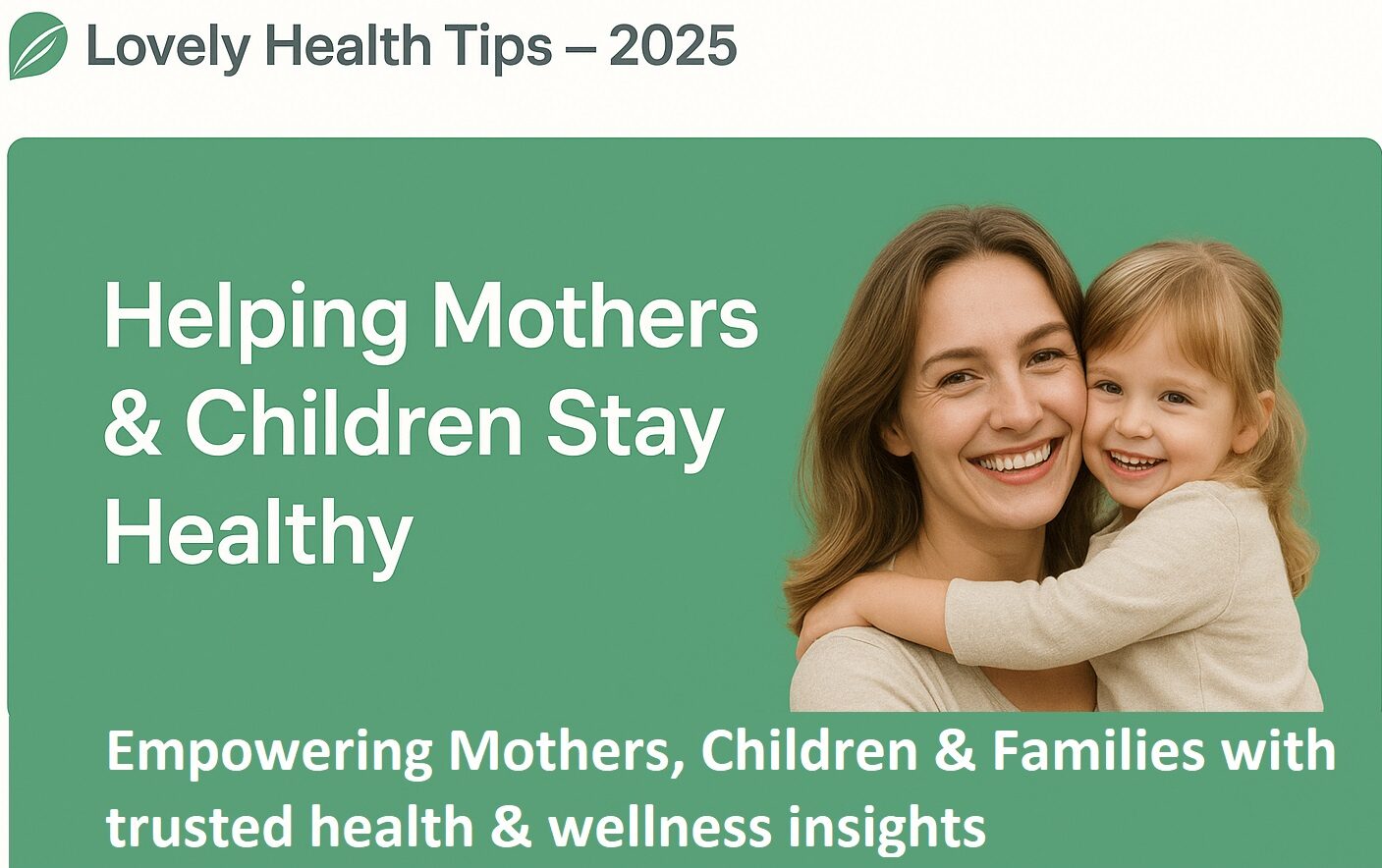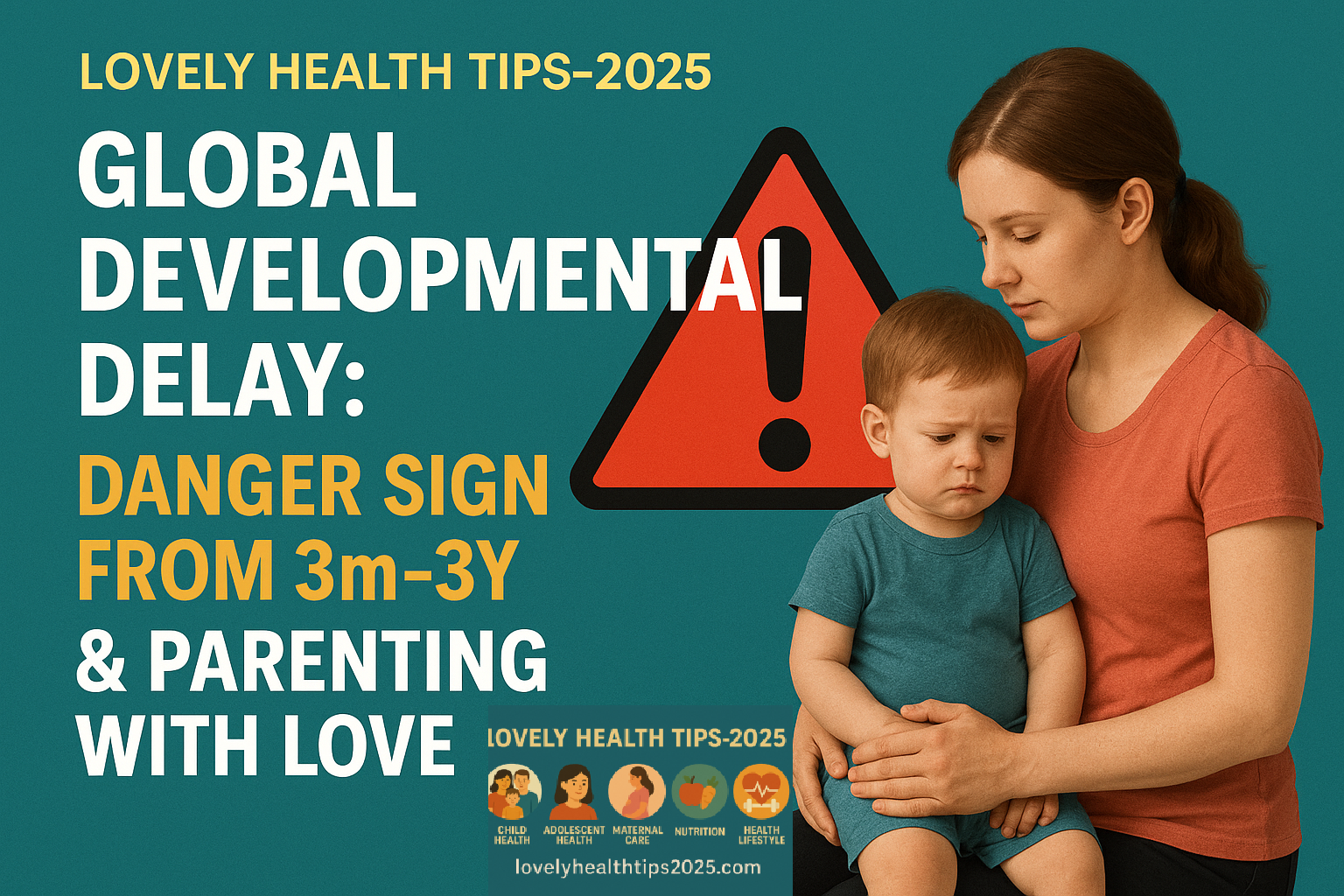Last Updated on October 21, 2025 by
Global Developmental Delay: Early in their development process babies undergo extensive learning phases and massive growth stages. Baby is just starting to interact with the world, see people he knows, respond to voices and practice those gross motor skills. Learning to talk and smile is a sign that your baby is progressing. Of course, parents can’t help but worry when their child does not meet certain developmental milestones. Every child develops in their own way, but beginning to notice development problems gives us a chance to provide necessary help and healthcare for them. Thanks to this article, you will be able to find any ‘red flag’ problems early, see warning signs and support your baby’s growth using love and patience.
A. Danger signs of baby for Global developmental delay at 03 months of age:
- No Smile in Social Situations
- Tries not to look in your face while you speak, feed or cuddle
- After two months, persistent squinting
- Stays calm and is not woken or shocked by unexpected loud sounds.
- Stiff arms and legs and a pushed-back head
- Keep your hands open or fisted and keep your thumb inside your palm.
B. Parenting Tips (by 2 to 3 months of age of a baby): Global Developmental Delay
- Give your baby a relaxing massage to help exercise all their limbs.
- Try to give your baby some time every day to lie face down on their stomach.
- Every day, play and cuddle with infants. Babies are not spoiled by cuddling or by being rushed to respond to every scream.
- You should engage in daily speech with infants through your native language.
- All babies should be able to follow a bright and moving toy kept 30 cm (1 foot) directly in front of them.
- Keep children away from using digital media.
C. Danger sign of a baby for Global Developmental Delay at 06 months:
- A lack of control over one’s head.
- They are not able to hold the person upright for sitting by themselves.
- Is unable to hold objects that are within reach
- S/he may not speak the sound ah, eh or oo etc.
- You do not move your eyes or head around to look at moving objects.
D. Parenting Tips by 4 to 6 months of age of a baby: Global Developmental Delay
- Parents may talk with their newborns by mimicking different sounds & rewarding them in-turn when they mimic you
- Newborns need their parents to copy their sounds and receive positive feedback when they reflect back sounds.
- Making interesting items accessible to infants, placed on the floor within their reach, lets them explore more easily.
- Introducing children to different parts of the world requires taking them into outdoor environments.
- Sucking on fingers tends to relax kids. The condition is harmless. Don’t give up on it too early. (Global Developmental Delay)
E. Danger sign of a baby for Global Developmental Delay at 09 months:
- Unable to roll over
- Requires assistance to sit
- Does not look in the direction of a sound (out of sight)
- Speaking problem with words like pa.. pa..pa, ma.. ma, ba.. ba..ba etc.
- Always tilts the head to one side when examining stuff.
F. Parenting Tips by 7 to 9 months of age of a baby: Global Developmental Delay
- Kid should be allowed regular object-dropping together with banging and tossing to learn. Noisy children should be treated through gentle and good interaction as this is the only proper way to react to such children.
- Home tools that pose no health risks should be available to children for their playing and exploration.
- Peek-a-boo is an excellent activity to be done with the infants as a bonding activity. Children should have a box or cloth placed over their most cherished toys. (Global Developmental Delay)
G. Danger sign of a baby for Developmental Delays at 12 months:
- Unable to use fingers and thumbs to pick up little objects
- Does not extend their hands to be lifted
- Does not react to one’s own name
- Avoid looking for toys that are partially hidden so the youngster can see you hiding them.
- Does not engage in social games such as peek-a-boo (anakh michauli/jhalak).
H. Parenting Tips by 10 to12 months of age of a baby:(Developmental Delays)
- Place the toys you give your child in convenient positions, but out-of-reach so that they can be encouraged to stand with assistance.
- Demonstrate children the ways of using a gentle touch.
- Children occasionally hurt others by their natural exploration of their environment.
I. Danger sign of a baby for Developmental Delay at 18 months:
- Could not get on without support.
- Small objects cannot be placed inside a container.
- Does not blame an item when it is named
- Autism Spectrum Disorder characterizes the way this individual disconnects from interactions with their mother while focusing on their own thoughts.
- They enjoy completing their day-to-day activities using either their right hand or left hand without any hindrances.
- It doesn’t state “single.”
- Phrases like “dada” or “mama”
J. Parenting Tips by 18 months of age of a baby:
- Infants benefit from push toys because they promote their walking abilities.
- Give kids some toys, fruits, etc. Request that they identify the items, place them within containers, and remove them.
- Present basic inquiries to your children. Urge them to speak. (Global Developmental Delay)
K. Danger sign of a baby for Developmental Delays at 24 months:
- When tugging a toy, does not walk steadily
- Unable to scribble
- While baby is not able to express two words viz. give milk, mama milk etc.
- The child gives a bad reaction to sign language signals whether namaste or salute gestures are given.
- Does not indicate bodily parts
- The child is unable to do simple things as instructed by others.
L. Parenting Tips by 24 months of age of a baby:
- Children should have access to secure environments for their running, climbing and walking activities.
- Let children see you do the different skills for them to learn and apply them on their own. When your child makes a mess be composed and put things in an orderly manner.
- Making a regular sleep-wake schedule for children is important for parents.
- Books should be joined by paper, chalk, colors and other writing tools for scribbling. The development of your baby comes largely from having love for them, being patient and sticking to your duties.
M. Danger sign of a baby for Developmental Delay at 03 years:
- Services are needed because Developmental Delays cannot climb up or down stairs
- Cannot eat without help
- Has difficulty communicating without errors & keeps repeating others speech
- Does not play “Pretend” games
- Continuous drooling, unclear speech
- Not able to speak small simple & three word sentences viz. mama give milk
N. Parenting Tips by 03 years of age of a baby:
- Outdoor games may be played with children to enhance the motor skill & physical activity.
- You may give different types of TLM (teaching learning materials) viz. blocks, puzzles, rings, etc. to children
- Skill of children can be improved by move the hands of children by self which will improve their skill
Parenting tips:
- Follow how you feel, but let others help if you need it, because all your successes together matter. Your child is an exceptional person with many chances in life.
- Use your intuition, but it’s good to ask for help now and then, as every little step forward is a success.
- Your child is a special person who can embrace many chances in life.
- Continue with your belief and affection toward your children while you fulfill their needs.

FAQs:
Q1. Global Developmental Delay means?
Ans. Such a state of health in which the child demonstrates retarded development in several spheres is referred to as Global Developmental Delay (GDD). The medical condition called Global Developmental Delay affects children who exhibit important delays between two or more developmental areas including motor skills together with speech and both intellectual development and social capabilities in relation to their peers.
Q2. Global Developmental Delay produces what warning signals in children between 3 months to 3 years?
Ans. Children with Early Developmental Problem show symptoms such as limited head control during 3–4 months, difficulty sitting independently by 9 months, single words deficit from 15 to 18 months and lack of social emotional expressions including slow progress with walking beyond 18 months.
Q3. What are the different steps doctors take to identify Global Developmental Delay?
Ans. Ans. To diagnose GDD, health specialists review a child’s development using assessment tools, past milestones, basic exams and in a few cases, they also look at the brain or genes using imaging or gene tests.
Q4. What can the parents do to demonstrate their love to a child who should be supported because of his/her developmental delays?
Ans. If parents provide love, take time with their children and teach them calmly with rewards and daily praise, their kids are more likely to be content and succeed.
Q5. Is Global Developmental Delay permanent?
Ans. Yes, it may be permanent. Therapies that come with extra attention often assist children with minor developmental issues in meeting their milestones, but for children facing constant issues, a diagnosis of either autism or intellectual disability may come later in life.
Q6. A timely intervention provides opportunities for Global Developmental Delay to show improvements.
Ans. Yes, Periodical & Regular use of therapy can improve the situation.
Guideline of WHO for Dengue Disease and its link as mentioned below: https://www.who.int/srilanka/news/detail/01-10-2023-caring-for-children-with-developmental-delay-reaching-the-vulnerable
Thanks and Regards
About the Author – “Mr. Bibhu Ranjan Mund”, Master in Public Health (MPH) from IIHMR University, Jaipur (Rajasthan) has experience of 18 years in Public Health activities. Through “Lovely Health Tips-2025”, we share the evidence & experienced based health & wellness guides with solutions for every day well-being. More from Author
Disclaimer
This information is suggestive only and not a replacement for medical advice. For more detail, please visit to my website as mentioned below:

